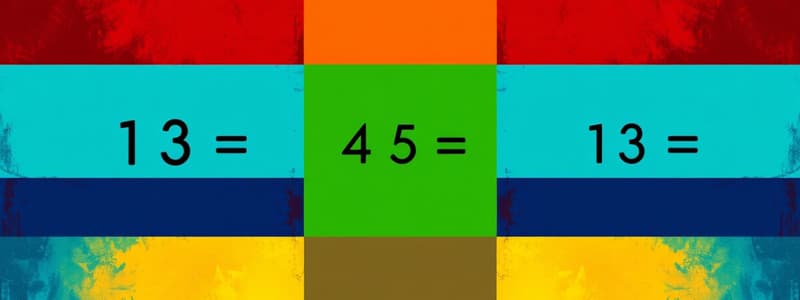Podcast
Questions and Answers
What action should be taken if the digit in the ten-thousands place is 4 during rounding to the hundred-thousands place?
What action should be taken if the digit in the ten-thousands place is 4 during rounding to the hundred-thousands place?
- Keep the hundred-thousands digit the same. (correct)
- Leave the ten-thousands digit unchanged.
- Round the hundred-thousands digit up by 1.
- Change the hundred-thousands digit to the next highest digit.
In which field is rounding most likely used to simplify complex data for presentations?
In which field is rounding most likely used to simplify complex data for presentations?
- Manufacturing for production schedules.
- Finance for budgeting.
- Demographics for population estimates. (correct)
- Healthcare for patient records.
Why is understanding place value important when rounding numbers?
Why is understanding place value important when rounding numbers?
- It allows for converting decimals to fractions.
- It ensures rounding is done accurately based on significance. (correct)
- It maximizes the number of digits in a number.
- It helps in performing basic addition.
When rounding a number to the nearest hundred-thousands, what happens to the digits to the right of that place?
When rounding a number to the nearest hundred-thousands, what happens to the digits to the right of that place?
What effect does rounding have in construction when estimating costs?
What effect does rounding have in construction when estimating costs?
Flashcards are hidden until you start studying
Study Notes
Rounding Rules
- Determine the digit in the hundred-thousands place.
- Look at the digit immediately to the right (the ten-thousands place).
- If this digit is 5 or greater, round up the hundred-thousands digit by 1.
- If this digit is less than 5, keep the hundred-thousands digit the same.
- Replace all digits to the right of the hundred-thousands place with zeros.
Applications In Real Life
- Finance: Budgeting and expense reports often round amounts for simplicity.
- Population Estimates: Demographics are rounded for easier comprehension in reports and presentations.
- Statistics: Data sets may be rounded to facilitate trends analysis.
- Construction: Cost estimates or measurements are rounded to avoid potential overestimations.
Place Value Significance
- Understanding place value is crucial for accurate rounding.
- Each place in the number has a different weight (e.g., hundred-thousands > ten-thousands > thousands).
- Rounding impacts calculations and measurements, emphasizing the importance of precision in high-value places.
- Helps in estimating quantities and simplifying large numbers for easier communication and understanding.
Rounding Rules
- Identify the hundred-thousands place in a number.
- Examine the ten-thousands place to determine rounding.
- If the ten-thousands digit is 5 or more, increase the hundred-thousands digit by 1.
- If the ten-thousands digit is less than 5, retain the original hundred-thousands digit.
- Convert all digits following the hundred-thousands place to zeros after rounding.
Applications In Real Life
- Finance: Simplification through rounding is common in budgeting and expense tracking.
- Population Estimates: Rounding makes demographic data more accessible and easier to comprehend in reports.
- Statistics: Rounding in data sets aids in analyzing trends without overwhelming detail.
- Construction: Rounded cost estimates and measurements help prevent over-budgeting.
Place Value Significance
- Mastery of place value is essential for precise rounding practices.
- Each numerical place bears a distinct weight, impacting rounding outcomes (e.g., hundred-thousands holds greater significance than ten-thousands).
- Accuracy in rounding is vital for calculations and measurements, especially in high-value contexts.
- Rounding enhances the ability to estimate quantities and simplifies large figures for better understanding and communication.
Studying That Suits You
Use AI to generate personalized quizzes and flashcards to suit your learning preferences.




